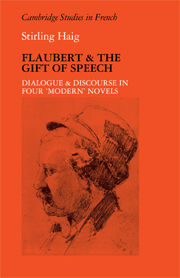Summary
“The nineteenth-century novel … created an important novel-type in which the hero is a man who only talks, who is unable to act and is condemned to naked words.” So wrote Bakhtin in his long essay on “Discourse in the Novel.” The words seem particularly appropriate to Frédéric Moreau, but they are equally applicable to Emma Bovary. In the case of Flaubert, it is the representation of this awareness of the disjunction of word and action that underlies his admiration for Don Quixote. (Harry Levin once called Emma a female Don Quixote.) Why then, in the same letter where he praises Cervantes, would Flaubert express his disdain for Le Rouge et le Noir, whose author, no less than Flaubert, deplored the triste dix-neuvième siècle? Both books would seem to partake of the “perpetual fusion of illusion and reality” that made Cervantes' work “un livre si comique et si poétique” (22 November 1852). The protagonists of both works act as well as talk, and both experience failures of speech. Julien and Don Quixote suffer from betrayals of the logos. Here we must turn for a moment to the myth of Flaubert.
The Flaubert that literary history has handed down is that of a monastic devotee of pure Art, a fanatical recluse committed to a painstaking quest for the mot juste – and thus holding an implicit faith in the efficacity of the writer's task.
- Type
- Chapter
- Information
- Flaubert and the Gift of SpeechDialogue and Discourse in Four "Modern" Novels, pp. 170 - 172Publisher: Cambridge University PressPrint publication year: 1986

